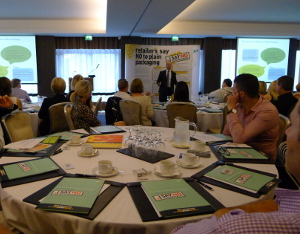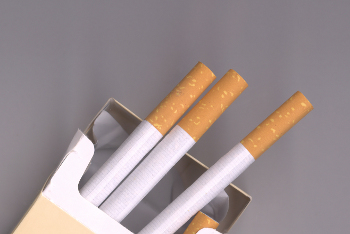Say no to plain packaging

Over 50 retailers from across Kildare took part in the ‘Say no to plain packaging' roundtable discussion held in Newbridge last month. Anne Brady reports on the concerns raised by retailers on the government's proposed plain packaging legislation and the alternative measures outlined at the event
17 October 2013
This was the 11th retailer roundtable that Japan Tobacco International (JTI) had organised across the country. The impact of the plain packaging legislation and what to do about it was the focus of the discussion. The evening began with a video that delivered a strong visual message of the negative impact plain packaging legislation would have.
Importance of premium tobacco category
On 28 May, Minister Reilly got approval from government to start the process to introduce plain packaging. Derek Mooney, sales director with JTI said the message was clear – plain packaging was going to be very damaging to the retail sector. He talked about the importance of the premium tobacco category for Ireland and how currently this category accounts for 71.5% of all tobacco sales. He highlighted the issue of plain packaging commoditising cigarettes. There is a strong possibility that customers, no longer able to visually identify their favourite brand, would trade down to value brands. This in turn would impact on turnover. He stated that a 50% drop of current premium smokers to value brands would result in a loss of €85.1 million to the industry.
Better option available
The sales director mentioned a better option that had already been discussed at an international level. In June of this year, Angela Merkel commented on the importance of intellectual property and how the current pictorial warning on tobacco products is an acceptable compromise. Mooney said the health warning allowed tobacco companies to maintain their branding on a small portion of the box. This would then not interfere with their intellectual property rights.
Graeme Feely, plain packaging coordinator with JTI spoke with a positive note, saying there was still an opportunity to put a halt to the legislation it if was tackled in the right way. Feely commented on how it wasn’t as simple as making a pack plain as the unintended consequences for business could be huge. Feely said the issue had gone beyond the tobacco industry and will have a significant impact for retailers also. The reason, he said, is the importance of a brand, highlighting his point using a Nike t-shirt. If you take the brand away all you are left with is a commodity. Consumers buy products but they attach themselves to brands so if the brand is removed, price becomes the primary driver.

Introducing plain packaging for tobacco products could have huge unintended consequences for legitimate tobacco
Black market threat
Feely talked about the growth of black market trade over the last few years and how it is costing retailers money. He said the illicit market was already at 25% and if price becomes the primary driver this market would grow rapidly. He emphasised that it certainly wasn’t going to make it any better or reduce it. Feely highlighted a number of issues that Minister Reilly had apparently not taken into account such as purchasing cigarettes in Northern Ireland or any country while on holiday and bringing them back to Ireland. He also pointed out that consumers could continue to buy counterfeit cigarettes while looking for their preferred brands. He added that Minister Reilly refused to address the connection between the two (plain packs and illicit trade) but the statistics show a different reality.
Tackling youth smoking
Feely finished by drawing attention to the importance of education. He said if the government were to devote as much resources and put in place the same programmes as they had in Germany in regards to smoking they would have practically eradicated youth smoking at this stage. Yet the Irish government continue to bring in legislation that affects retailers. "This is going to be the most costly piece of legislation that this country has introduced in relation to retailing, costing massive amounts of money. We’re not saying don’t do anything – we’re saying there’s a better way of achieving what he wants to achieve."
Retailers have their say
The floor was then opened up to the retailers to discuss what they saw as the biggest issues and what they felt could be done about it. Many in attendance focused on the impact illicit trading has had. A notable difference in trading could be seen from month to month when particular counterfeit brands were in circulation. Additionally, the issue of stock management and confusion at the till was going to have a large impact. Some thought that it may result in a reduction in the number of brands sold in shops. An interesting point that was brought up was the continued purchasing of tobacco regardless of the health warnings. Retailers were not happy that government continued to make decisions that put pressure on their businesses and were adamant that something should be done. A popular idea was to deliver an awareness campaign highlighting the impact illicit tobacco would have on the economy and on society as a whole.



 Print
Print






Fans 0
Followers